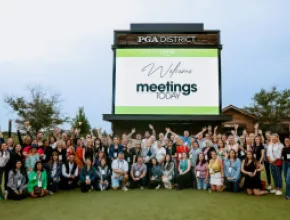I’ve been offering applied improv programs for groups for the past 30 years and teaching people how the tools of improv can improve their personal and professional lives.

Here are four ways you can incorporate the tenets of improv into your day-to-day life as a meeting or event planner and/or for your attendees.
1. Practice Spontaneity
A common belief about improvisers is that they think faster than others, but the truth is improvisers don’t think much at all. They act fast because they’re not judging their response. There’s no “what’s the best answer?” or “what does this say about me?” involved.
In improv, anything is possible, but not everything will work on stage. Improvisers are willing to take risks because the games have no real-world consequences. This lack of stakes makes it easier for people to float ideas, respond spontaneously and experiment with characters.
If you want to become more spontaneous and stop second-guessing yourself, try the game “5 Fast Things.” First, pick a category, and then name any five things that fit that category. For instance, for the category “curtains,” you can say “fabric, wind, sheer, blackout, window, etc.” If you get stuck, just say anything and move on.
2 Safety Zone Vs. Comfort Zone
Before demonstrating an improv activity to a group, I’ll often ask for a volunteer. But generally, few people raise their hands, and some groups offer no raised hands at all.
[Related: Corporate Comedian Greg Schwem Talks the Serious Business of Laughter]
I’ll often just wait quietly until someone volunteers. But then I’ll ask the ones still seated, “What kept you from raising your hand?” Some common answers include “I don’t know what I’m getting into” or “I don’t want to be embarrassed.” This line of thinking is fear-based. They don’t feel safe, so they hold back.
Viewed objectively, improv is a safe activity. What the participants that feel unsafe are feeling is uncomfortable. Being aware of the difference is key to expanding your comfort zone around risk. For example, people who love roller coasters ride them to be uncomfortable, but they also feel relatively safe.
3. Notice How you Play
One of the applied improv tenets is “the way you play in improv is how you are in other parts of your life.” Applied improv lets us accurately assess how we show up in the world. For some reason, people won’t be as defensive when talking about an improv game, and this honesty can help us become aware of how our beliefs and behaviors affect both our professional and personal relationships.
One time, I was at a conference and we were talking about an improv game. When asked to describe the experience, a participant answered, “I wasn’t a good teammate because I didn’t answer quickly.”
[Related: 5 Benefits of Hiring a Standup Comedian for Your Meeting or Event]
When I reminded her that the game had no time limit, she said, “I heard that, but I didn’t believe it because nothing in my life has no deadline.” As she spoke, I could almost see a light bulb go on over her head. “Wow! I now realize why my direct reports are so nervous around me.”
In that moment, she understood that she carries a sense of constant urgency even when it’s not needed that was putting a lot of unnecessary stress on her team.
4. Stay in the Moment
Improvisers learn to stay in the moment and act on things they can control. When they are surprised, stressed or uncertain on how to proceed, they turn to something called the point of concentration (POC).
Ask yourself “What’s the smallest bit of information I need in order to move forward toward my goal?”
Refocusing your POC onto the things that matter most and staying present in the moment can change would-be distractions into opportunities for focus and continuity.







